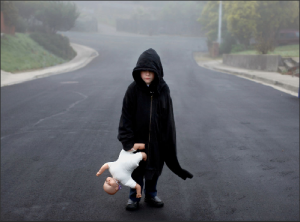Making JP comfortable with his new sister, Ellie, is sensitive enough without the addition of divorce as a factor, but such is the nature of my life, and I’m not complaining. I’m a happily divorced man, thank you very much. But it does mean that the process of helping JP adjust to a new sibling does not stay entirely within my control. His mother influences it, too, as is her right as JP’s mother.
In most ways, she has been terrific. She walked my (formerly “our”) dog while I was busy at the hospital with Tomoko and Ellie, and she drove JP into Manhattan, on one of her days, so that he could meet his new sister.
She does, however, seem to be inordinately worried about JP’s ability to live with a sister. Throughout Tomoko’s pregnancy, JP seemed, if anything, excited about what was coming. Mostly, though, he just didn’t get it. He didn’t really understand that a person resided in Tomoko’s belly, that this person would be important in his life, that she would live with him, take up half of his room, and eventually steal all of his toys. He’d nod at me as if he understood everything when I discussed it with him, but I was convinced he wasn’t taking it all in. But, and this is important, he didn’t seem upset about any of it.
The day before Ellie was born, though, JP’s mother contacted me to say that JP was “sad.” This surprised me, given the events of the past nine months, but I felt I had to take it seriously. JP could have changed his mind about his new sister when her arrival neared. When he came to the hospital to meet Ellie, I took him aside, told him how much I loved him, tried to explain that his sister was part of his life in a good way, and that while things might be different, they were going to be good. JP agreed, somewhat indifferently, and asked if we could go see the baby.
Since the baby has been home, JP has struck me as rather confused. He asked how long Ellie would be staying with us, wanted to know where she was going to sleep, and was generally curious to see her eat, sleep, cry, and have her diaper changed. He still doesn’t seem to have figured everything out, but again, I have yet to see him be unhappy about the new circumstances, except that I’ve scolding him a bit more about being too loud.
Which leads me back to JP’s mother. I’m not going to say that she made up JP’s sadness—I don’t believe she did. But I know a child this age—or at least with my child—tends to reflect your attitudes back to you. I’ve tried to show JP that I feel positive but not wildly over-excited about his new sister, and I believe he has communicated that attitude back to me. Does that demonstrate his true feelings? I don’t really know. Frankly, I bet he doesn’t know what his true feelings are right now. But I feel like it’s my responsibility to model the behavior that I would like from him.
Yesterday JP’s mother called me to ask how JP was doing. I told her he was fine, upbeat about Ellie, but definitely still confused. She told me that before Ellie’s birth she had had a conversation with JP. She had said that a sister was a big event, and that it might bring out new feelings in him—good or bad—and that he should communicate those feelings. Nothing wrong with that in theory, but given the fact that JP likely parroted back to her what he thought she wanted, his sadness strikes me less as a genuine feeling (although I won’t discount it entirely) and more a subconscious bit of undermining on the part of my ex-wife.
Don’t get me wrong. I’m not saying JP’s mother has done something wrong. But I do wish she would do things differently. Is it right for me to paper over JP’s potential discord about his sister? No. But I’d prefer to encourage him to be positive and wait to react to any disturbance if it exhibits itself. Encouraging him to be sad in the name of allowing him the freedom of his emotions just isn’t my style as a parent. I’d rather prepare for the good things and deal with the bad as they happen instead of the other way around.

